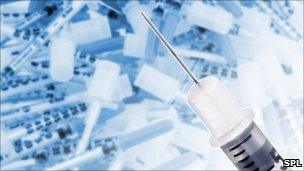Diabetes costs 'out of control'
- Published

Insulin is just one of many drugs available for diabetes control
The NHS is spending too much on diabetes drugs say researchers, who found the medicines account for 7% of the UK prescribing budget.
A big rise in the number of people with type 2 diabetes in recent years does not fully explain the spiralling costs, say Cardiff University researchers.
With rates of the condition expected to rise further, the NHS needs to get the budget under control, they conclude.
But GPs said they had to look out for the best interests of their patients.
In 2008 the NHS spent £700m on drugs to control blood sugar, figures show.
The researchers calculated that between 2000 and 2008 the number of prescriptions for glucose-lowering drugs had risen by 50%.
But costs, even taking into account the price of inflation, rose by 104%, they said.
Writing in the journal Diabetic Medicine, they said figures for England specifically show an increase from £290m to £591m over the study period.
Researchers pointed to marked increases in use of the most expensive therapies.
Newer drugs, like rosiglitazone, as well as increasing use of insulin - the hormone that controls blood sugar levels in the body - have contributed to the increased costs, they said.
Lifestyle
Dr Chris Currie said the findings suggested that national guidelines are not being followed.
The National Institute for Health and Clinical Excellence recommends lifestyle changes as a first-step in controlling type 2 diabetes, before drug treatment is started.
GPs should then start people on the basic treatments before looking at other options if they do not work.
The researchers said in recent years the new expensive treatments had been aggressively marketed by drugs companies.
However, the figures also showed a dramatic rise in use of metformin - a cheap generic drug recommended as first line treatment - which the researchers said was reassuring.
It is thought that 2.6m people in the UK have diabetes - 90% of those type 2 diabetes - and a further one million have the condition but have not yet been diagnosed.
"The drugs bill is extremely high," said Dr Currie.
"Somebody has got to take a lead in managing the way we treat people with diabetes and making sure doctors adhere to the recommendations.
"This is going to continue to rise and part of the issue is people don't realise how big the problem is."
But Dr Niti Pall, a GP in Birmingham and spokesperson for Diabetes UK said she did not agree with the authors' conclusions.
She said the job of GPs was to get blood sugar levels as low as possible by whatever means possible to prevent complications in their patients.
"They have not looked at the health economics, we are saving the NHS money in the long run.
"We need to do whatever it takes to get blood sugar down and some of the cheaper drugs don't do the job."